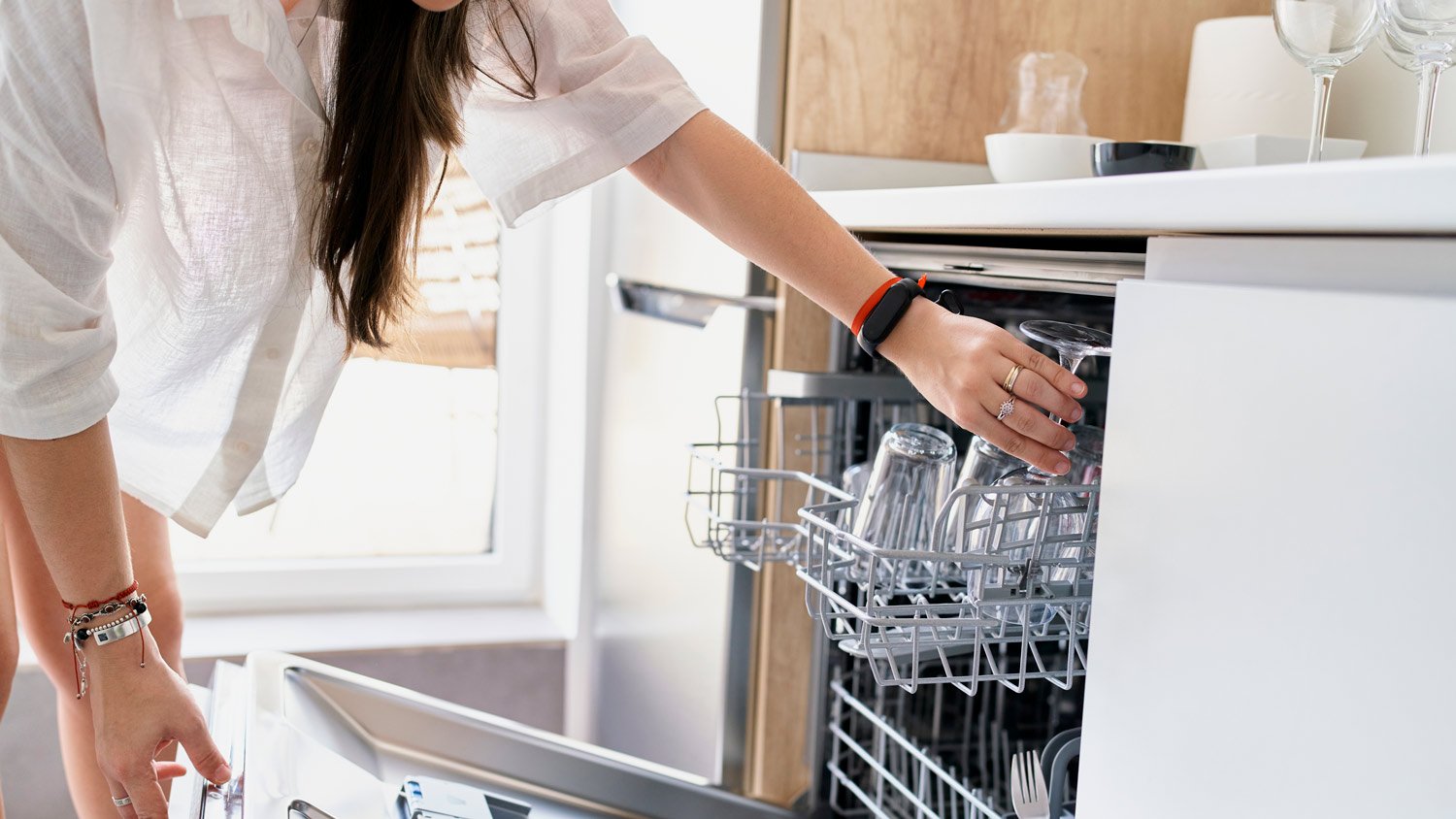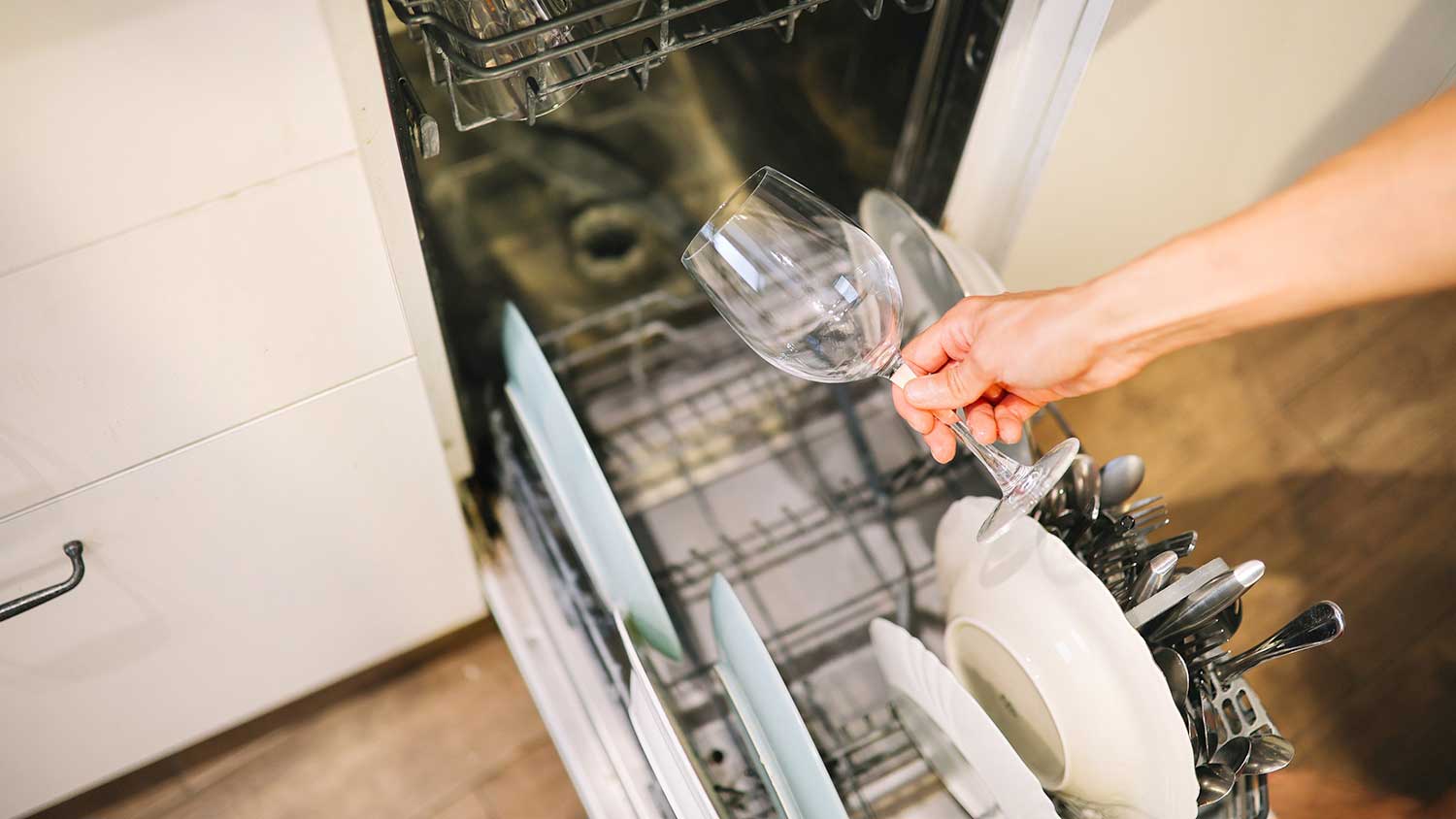Do Electronic Water Descalers Work?
Are clean dishes and soft water too much to ask?


Hard water can damage your pipes and fixtures, eventually costing you money over time.
Water descalers use magnets to prevent the minerals in hard water from building up inside your plumbing system.
A water softener is a more complete solution and is a better option for areas with particularly hard water.
Your countertops have residue, your dishes have a film on them, and your shower doesn’t seem to stay clean. By now, it’s pretty clear you’ve got a hard water issue. Not only is mineral-laden hard water aesthetically annoying, but it can also clog your pipes and significantly impact your washing machines and dishwashers. So, is a water descaler the answer? Or do you really need a water softener?
To help you decide, we’ll explain what exactly descalers do and which solution is your best bet for combatting hard water.
What Is Hard Water?
Hard water is water that's loaded with minerals. As the groundwater works its way over rocks and through soil, it picks up tiny mineral particles such as magnesium and calcium. The dissolved minerals are the source of water hardness.
Hard water can:
Leave a residue on your countertops and dishes
Decrease the lather from detergents, soaps, and bath and shower products
Dry up your skin and hair
Cause mineral buildup in your pipes
Interfere with heating and cooling systems
Significantly shorten the lifespan of your washing machine, dishwasher, and any other appliance that uses water
To rectify such an issue, many homeowners may opt to have a local water specialist assess their water and then a plumber to fit their homes with a water softener (a logical conclusion, no doubt), but a descaler could also help eliminate some of the problems.
The main difference between soft water and hard water is the mineral content. Hard water has higher levels of calcium and magnesium, whereas soft water has undergone a process to remove these minerals.
What Does a Water Descaler Do?
You may wonder: what do descalers do, and do they even work? Yes, they work in the sense that they help reduce the impact of hard water on your pipes and appliances. But they do not soften water.
A water descaler reduces scale buildup in your pipes and appliances by changing the structure of hard water minerals. This prevents the minerals from sticking to surfaces without removing them from the water altogether.
A magnetic descaler stops the deposits from adhering to your plumbing, thereby thwarting the long-term effects of scale on your systems. So, while your plumbing and appliances should fare better, you'll still have hard water and experience the effects like soap scum on your dishes, stiff laundry, and "grimy" hair and skin. It doesn’t “soften” the water, and it’s not considered a type of water filter, like a softener. If you have the budget and want to enjoy the benefits of soft water (soft, comfy clothes, shiny hair, and bubbly bathwater, anyone?), you need a water-softening system instead.
The descaler itself has coils that wrap around the cold water intake pipe (your water supply) and generate a magnetic field or a low-voltage current that charges the mineral particles. This positive charge holds the particles in the water so that they're less likely to deposit themselves on surfaces, including the insides of pipes, heating elements, countertops, and appliances.
What Are the Benefits of a Water Descaler?
The biggest benefit of water descalers is that they reduce the impact of hard water on any surface water touches. Other benefits of a water descaler include longer appliance lifespans, lower maintenance costs, and easier cleaning. Descalers are also considered eco-friendly and are salt-free, which is a plus for many homeowners.
Water Descalers vs. Water Softeners for Hard Water

You may wonder, what’s the difference between water softeners versus descalers? While a water descaler holds the minerals in the water to lessen its impact on your plumbing, a water softener works by removing the minerals to produce softer water. Water softeners use sodium chloride-charged polystyrene beads to catch the mineral particles. As the minerals flow over the beads, they switch places with the sodium chloride ions.
With a water softener, the sodium chloride content in the water is insignificant and undetectable by taste or smell. The result? Water that doesn't leave your clothes stiffened with soap scum. You’ll also get to enjoy baths with bubbles again. And your appliances and pipework should perform more efficiently and be less prone to breakdown and clogs.
However, water softeners are more expensive and harder to install than descalers. Electronic water descalers cost, on average, $200, which is much lower than the cost to install a water softeners, which totals between $800 and $3,000. You'll need to hire a local water softener specialist to install these systems for you because they require adding new pipework with valves to direct the water into the softening unit and back out into your home.
Keep in mind that, although they come with a higher upfront cost, water softeners last for between 10 and 15 years, depending on a few factors, like how often the softener regenerates. This is usually longer than the 10 years a descaler lasts. Plus, they provide a more permanent solution to hard water.
Not all septic fields are equipped to handle the backwashing cycle of most softening systems, and this water may need to discharge outdoors.
Make sure to ask your water pro about the best system they recommend for your home. Lastly, you may need to have someone perform regular maintenance on your water softener.
Frequently Asked Questions
Yes, descaled water is safe to drink for humans, pets, and plants. It doesn't have any extra sodium and the essential trace minerals we need for our health are still there. And, interestingly, descaled water is better for your aquarium than softened water because it has a stable pH so it won't upset your fish.
No, a water descaler won't descale pipes. The charged water running through the pipes may very slowly dissolve mineral deposits and hold them inside the water, but it's a very gradual process. If your pipes do need descaling, it's much better to get a local plumber to descale your pipes.
While you can technically use both a water softener and a descaler simultaneously without serious risk, it's not recommended. Using both at the same time can have conflicting effects and also lead to an increase in salt levels in your home's water.





- What’s the Difference Between Hard Water and Soft Water?
- A Water Softener Can Help Your Appliances Last for Years Longer
- Can Hard Water Ruin Your Appliances?
- What to Do About Hard Water in Your Washing Machine
- How to Tell If You Have Hard Water: 10 Telltale Signs
- What Is a Water Softener and Is It Right for Your Home?
- Why Does My Faucet Water Smell?
- Is a Water Softener for a Tankless Water Heater Necessary?
- What Is Well Water? Everything You Need To Know
- How to Choose a Water Line Size From Your Well to Your House












